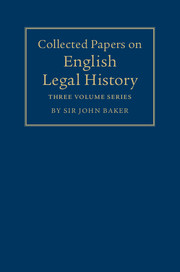Book contents
- Collected Papers on English Legal History: Volume I
- Contents
- List of Illustrations
- Acknowledments
- List of Abbreviations
- Introduction
- PART I The Legal Profession
- PART II The Inns of Court and Chancery
- 7 The Third University of England
- 8 The Inns of Court in 1388
- 9 The Division of the Temple: Inner, Middle and Outer
- 10 The Inn of the Outer Temple
- 11 The Old Constitution of Gray's Inn
- 12 The Ancient and Honourable Society of Gray's Inn
- 13 The Inns of Court and Chancery as Voluntary Associations
- 14 The Judges as Visitors to the Inns of Court
- PART III Legal Education
- PART IV Courts and Jurisdictions
- Collected Papers on English Legal History: Volume II
- Contents
- PART V Legal Literature
- PART VI Legal Antiquities
- PART VII Public Law and Individual Status
- PART VIII Criminal Justice
- Collected Papers on English Legal History: Volume III
- Contents
- PART IX Private Law
- PART X General
- Bibliography of the Published Works of Sir John Baker
- Index
11 - The Old Constitution of Gray's Inn
from PART II - The Inns of Court and Chancery
Published online by Cambridge University Press: 05 December 2014
- Collected Papers on English Legal History: Volume I
- Contents
- List of Illustrations
- Acknowledments
- List of Abbreviations
- Introduction
- PART I The Legal Profession
- PART II The Inns of Court and Chancery
- 7 The Third University of England
- 8 The Inns of Court in 1388
- 9 The Division of the Temple: Inner, Middle and Outer
- 10 The Inn of the Outer Temple
- 11 The Old Constitution of Gray's Inn
- 12 The Ancient and Honourable Society of Gray's Inn
- 13 The Inns of Court and Chancery as Voluntary Associations
- 14 The Judges as Visitors to the Inns of Court
- PART III Legal Education
- PART IV Courts and Jurisdictions
- Collected Papers on English Legal History: Volume II
- Contents
- PART V Legal Literature
- PART VI Legal Antiquities
- PART VII Public Law and Individual Status
- PART VIII Criminal Justice
- Collected Papers on English Legal History: Volume III
- Contents
- PART IX Private Law
- PART X General
- Bibliography of the Published Works of Sir John Baker
- Index
Summary
Although the origins of the inns of court and chancery are lost in mystery, and likely to remain so, more information is now being found in the public records than might have been foreseen a few years ago. Among the treasures in store are some fifteenth-century lists of members of Gray's Inn; but the present note is concerned with formal structure rather than with biography.
When the first extant pension book begins (in 1569), the society is found to be governed not by benchers but by readers. The style of pensions was ‘coram lectoribus’, and decisions were often expressed to have been made by the readers, never by the masters of the bench. There are, it is true, references to benchers even in Henry VIII's reign; but these refer to the fellows of the inn appointed to preside at moots, and even in Elizabeth I's time there were some learning exercises (the library moots) at which relatively junior fellows occupied the bench. There is no evidence of calls to the bench in a formal, permanent sense before Francis Bacon was admitted to the high table (‘where non ar but reders’) in 1586. There are also references to barristers, and by the 1570s there were clearly defined qualifications for election to the utter bar. It is clear, however, from the pension book – and from the earlier lost records extracted by Segar – that election as a barrister had far less significance than election to the grand company (magna societas).
- Type
- Chapter
- Information
- Collected Papers on English Legal History , pp. 185 - 190Publisher: Cambridge University PressPrint publication year: 2013



